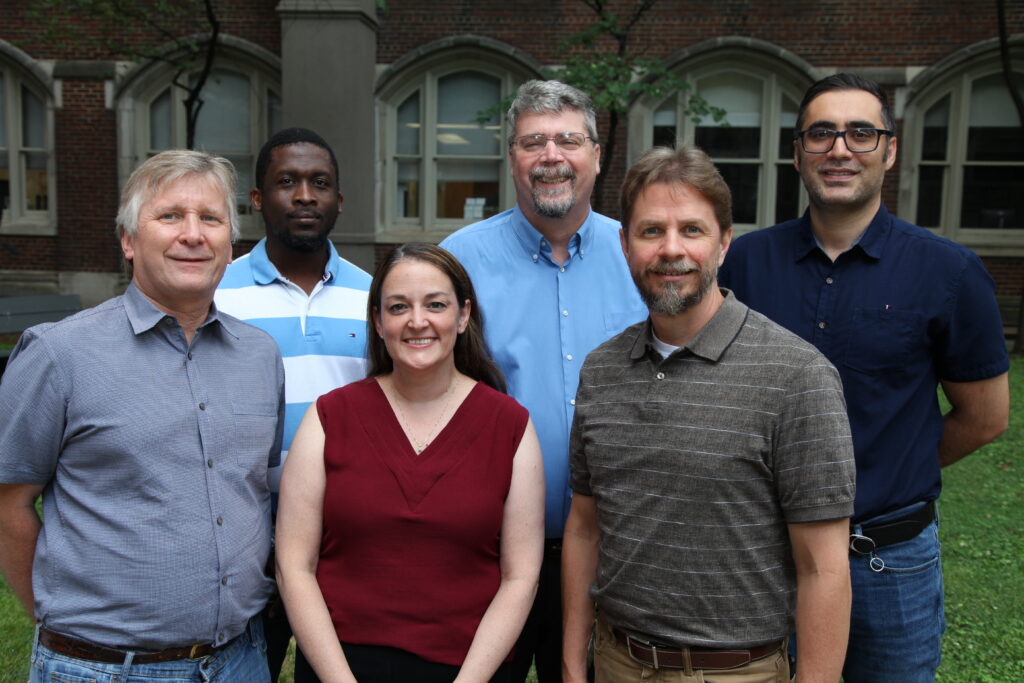
Front row (L to R): Gary Sulikowski, Dr. Amanda Doran, Alex Waterson
Sean Davies, associate professor and associate director of graduate studies in the department of pharmacology, is the first to receive support from the Innovation Ignition Fund for his project “Activation of NAPE-PLD as a Strategy for Treatment of Atherosclerotic Cardiovascular Disease.” His co-lead on the project is Dr. Amanda Doran, assistant professor of medicine and molecular physiology and biophysics. Postdoctoral research fellows Abdul-Musawwir Alli-Oluwafuyi and Reza Fadaei will round out the team.
Despite advances in the treatment of atherosclerotic cardiovascular disease—a general term for any disease of the blood vessels or heart caused by plaque buildup in artery walls—400,000 people in the U.S. still die of this disorder and nearly half of all patients experience recurring cardiovascular events each year.
Researchers have found evidence that improving the resolution of inflammation, particularly a step called efferocytosis, can limit the progression of ASCVD. The enzyme N-acyl-phosphatidylethanolamine hydrolyzing phospholipase D, or NAPE-PLD for short, holds promise to treat ASCVD because of its effects on efferocytosis.
Following a screening of 40,000 compounds from the High Throughput Screening Facility compound library, Davies and his team have identified more than 50 compounds that increase NAPE-PLD activity. The next steps in this drug discovery project, which the Innovation Ignition Fund will support, are to confirm that any of these compounds activate NAPE-PLD in macrophages, a type of white blood cell that plays a critical role in initiation, maintenance, and resolution of inflammation. They will then move their research along to proof-of-concept studies to further illustrate how these compounds can treat ASCVD and potentially other inflammatory diseases.
“The collaborative efforts of professors Davies and Doran to discover compounds that activate NAPE-PLD have considerable promise to treat inflammation” said John Kuriyan, dean of the School of Medicine Basic Sciences and University Distinguished Professor of Biochemistry and Chemistry. “The goal of the Innovation Ignition Fund is to support innovative ideas in drug development, and we look forward to seeing how their work in this important area progresses.”
Davies has been studying how NAPE-PLD can be used to treat ASCVD throughout his research career. He is one of the project leaders on a PO1 program project grant to study the role of high-density lipoprotein in ASCVD and related diseases that is now in its eighth year of funding from the National Heart, Lung, and Blood Institute. That project also recently won a Scaling Success award from the Office of the Vice Provost for Research and Innovation to conduct and interpret various experiments and to develop a medicinal chemistry plan. Doran is a leading clinical researcher in role of efferocytosis and the resolution of inflammation in atherosclerosis and will provide critical insights as this work takes another step forward towards the clinic.
“I am very grateful that funding by the Innovation Ignition program will allow us to really push forward this drug discovery project in a major way,” Davies said. “The long-term goal of my lab has always been to translate what we learn from our basic research in lipid signaling into new treatments for cardiometabolic diseases. This funding provides us the chance to fully optimize and characterize our small molecule activators of NAPE-PLD so that we can rigorously test their potential impact on cardiovascular disease.”
In addition to $500,000 in funding over two years, their efforts will be supported by scientific guidance from Gary Sulikowski, Stevenson Professor of chemistry and professor of pharmacology and director of the Vanderbilt Institute of Chemical Biology, and other scientific leaders in Basic Sciences, including Alex Waterson and Josh Bauer. The researchers will also take advantage of VICB’s High Throughput Screening Facility and Molecular Design and Synthesis Center to conduct their work.

“The new approach proposed by Sean Davies and his team, which has the potential for broader applications of these therapeutics beyond ASCVD, suggests wider translational potential and impact,” said Selene Colon, assistant dean for research. “This project exemplifies the innovative and transformative thinking within the School of Medicine Basic Sciences and wholly represents the spirit behind the Innovation Ignition Fund.”
The Innovation Ignition Fund, piloted by Basic Sciences and OVPRI, was created to support small molecule therapeutic projects at the very early target-validation and lead-optimization stages.